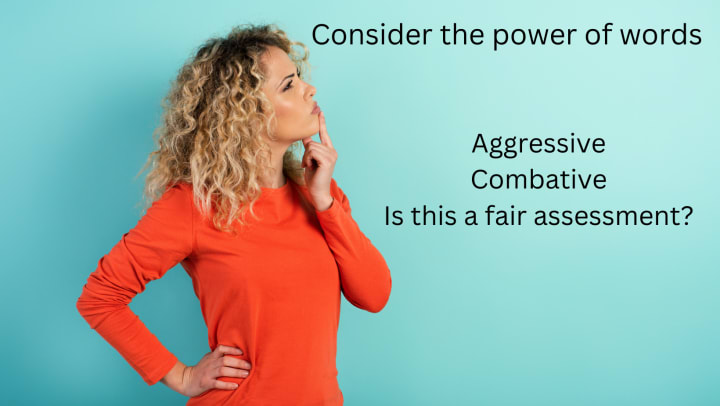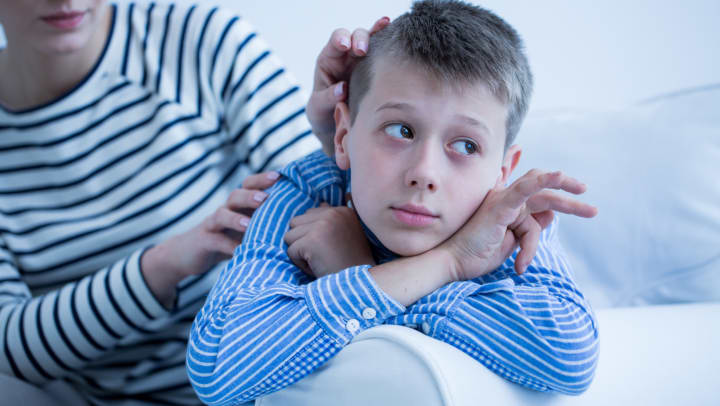Stop Assuming Our Autistic Children Are Combative
Personal experience and a theory on autism-related aggressive behavior

I will never forget the telephone conversation with a dental receptionist during the pandemic lockdown. Our regular local office was temporarily shut down due to quarantine restrictions, so patients had to receive treatments at the larger dentistry branch. I was engaged in a typical phone call, making an appointment for my son, when I mentioned he was autistic because this was not his routine provider and the staff were unfamiliar with my child's history.
The response from the receptionist left me feeling queasy and less than enthused about taking my son to be seen at their accommodations.
"Okay, ma'am, you must accompany him just in case he becomes combative."
WTF!!!
I politely responded that I would attend his dental exam and assured the receptionist that my son was not combative, but I kept thinking, what a gross assumption!
Unfortunately, this incident from two years ago is not the only time people have inappropriately judged my child or assumed something which bore no merit. Stares, eye-rolls, pointing, whispers, and snarky comments; you name it, and it's happened, but I suppose this is typical ill-informed behavior.
All I know is that assuming is never good for anyone. Just like the old saying goes and a childhood favorite of my fathers, “When you assume you make an ass out of u and me.”
Yes, my son has difficult days, and some of those days just happen to be when we are out in public, but if you don't know something firsthand, you simply don't know.
Misconceptions breed stereotypes and don't we already have enough of that in society?
It's easy to judge and formulate an opinion in one's mind, but this is often where humanity goes wrong. Lack of information, accurate information, that is, is potentially damaging.
As a parent of an autistic adult child, it is my mission to enlighten if only one person, as one more person who understands autism-related misconceptions, is another human who can spread the word portraying neurodivergent people accurately without the negative connotations.
In support of World Autism Month, familial experience, and profound parental love for my son, I plead: stop assuming our autistic children are combative!
Exploring an autism-related Theory

I think many times when people visualize an autistic person, they picture a person flapping their arms, yelling, or otherwise agitated. Unfortunately, this could not be farther from the truth and is one of the biggest autism-related misconceptions.
My research indicates varying statistics ranging from a 19 to 56% prevalence of aggressive behavior in autistic people.
But what exactly does aggressive mean?
Cambridge Dictionary defines aggression as showing anger and a willingness to attack others.
Combative defines as an eagerness to fight or argue.
"Aggressive" and "Combative" are strong words that paint a generalized, not-so-pretty picture when used about anyone, and labeling autistic individuals this way is unfair and discriminatory.
Furthermore, a misunderstanding of complex neurodevelopmental symptoms involving sensory-based triggers causes a reaction in an autistic person. For example, triggers like sound and sense of smell can be overwhelming, resulting in emotional outcries, confusion, and disconnection.
Is it plausible to say that onlookers (the ill-informed) often see these reactions and mistake them for aggressive or combative behavior?
I think so.
This is where better understanding comes into play; education is vital!
As autism research progresses, I would like to see different wording, replacing aggressive and combative. I would like for people to understand that autistic people have human reactions to stimuli, events, and circumstances; even if these reactions are different than yours or mine, they are still human.
Do some autistic children yell, kick, scratch, scream, lash out, and self-harm?
Yes!
These acts can be managed and, with proper coping techniques, improved over time, helping autistic youngsters grow into adults with more confidence and the right skills to help during heightened sensory instances.
Deeming sensory overload moments as acts of aggression are unfair as this word indicates intent behind the actions, and people with autism do not calculate their behavior; they do not act out with the purpose of causing harm, causing an uproar, or otherwise.
They are simply responding to upsetting and potentially traumatic triggers to the individual.
Again, no two people are the same; there many variables with ASD, ranging from underdeveloped to higher functioning, when we factor in things such as social cues, communication, and cognitive flexibility (the ability to shift mental focus from one thought to another).
The following are some common triggers of what I will refer to as elevated sensory occurrence or ESO instead of combative or aggressive behavior:
* sleep disturbances, irregular sleep patterns, lack of sleep, insomnia
* illness
* sudden disruption of personal routine — of the highly organized or those with repetitive actions
* social anxiety
* sensory-based trigger — sound, bright lights, sense of smell, taste, touch/texture
* low glucose, poor glucose tolerance; this point is widely unknown, but scientific data supports this factor
* By referring to the above as triggers prompting elevated sensory occurrences, the focus is no longer on the ill-perceived negative behavior and invokes more of an empathetic response.
ESO can be managed by removing the child from the triggering environment to someplace quiet/safe and redirecting the child's attention to something like soft, soothing music. Parents and caregivers should always remain calm and watch their tone of voice; do not speak loudly or use harsh words.
A personal experience with my son

Five summers ago, my son Elijah and I took a train trip To Lily Dale Assembly(the world's largest spiritual community) in Pomfret, New York. Elijah was 19 at the time, and this was before he was diagnosed with autism. At the time, we were only aware of his co-occurring condition, fibromyalgia.
Shortly after deboarding our train from Albany at Penn Station in New York City, my son was overcome with a potent whiff of urine.
I will never forget his response.
His mood quickly devolved from calm and cheerful to upset with an urgency to get away.
"I smell urine. It's so gross. I have to get out of here. I am going to puke," he repeated several times.
Each time my child repeated his words, his voice became a little louder and more desperate.
I recall some strangers, people walking past, strolling their luggage, looking over at us, pointing and shaking their heads.
My son became more distraught; he was sweating and felt weak.
Without giving the circumstances another thought, I quickly escorted my son to the nearest exit to get some fresh air. It was a busy hot summer day in the city, but the open space alleviated the irritation of his sense of smell, returning him to his previous state of calm.
When Elijah felt strong enough to return inside the train station to wait for our connecting train to arrive in about two hours, we navigated beyond the urine smell that triggered his upset and found a pizza shop to grab lunch.
Although unaware of his autism, I think about it now and can put it all together.
There would be a couple more stressors on this trip, but Elijah and I dealt with them together.
The pizza shop was packed and noisy, so my son put on his headphones and listened to his favorite music. He has always found solace in music; I just wasn't aware of the intimate connection with autism while he was growing up.
My brief example shows how abruptly enhanced sensory occurrences can come on.
Despite not fully understanding the weight of the situation at the time, I did two key things to help my son; remove him from the situation and redirect his attention.
Did his brief struggle draw attention?
Yes
Did my child raise his voice?
Yes
Was my son displaying an emotional outcry?
Yes
Was he behaving combatively?
No, he had what I prefer to call an elevated sensory occurrence.
As a mum of an autistic young man and a woman who stays on top of the latest developments in autism research, I hope this article sheds more light on one of the most common misconceptions regarding our autistic children.
Please remember:
* Aggression is not a symptom of autism
* Autism is a spectrum disorder affecting each person differently
* Implemented coping skills can help manage sensory-related overload
* misconceptions lead to stereotypes; let's put a stop to this
* Education is critical to providing accurate information
About the Creator
Marilyn Glover
7x Medium boosted poet, editor, and Reiki Master who is at her best when in nature. Creating to boost humanity while often not coloring within the lines. Follow me at: https://gmarilyn009.medium.com/






Comments (1)
Nice article ❤️😉🫵💯